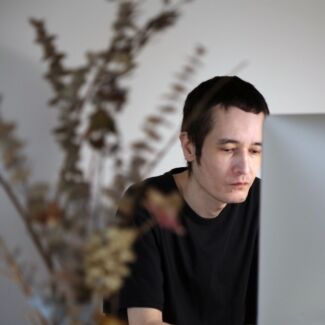Snuggle into the armchair
The Fold: From Your Body to the Cosmos
by Laura U. Marks
Durham, NC: Duke University Press, 2024
$29.95 USD / 9781478030119
Reviewed by Thomas Girard
*

Professor Laura U. Marks of Simon Fraser University uncovers some beautiful comparisons and evolutions of ideas stemming from existing inspiration – people and otherwise, living and otherwise, and possibly everything that is not part of a people and living juxtaposition as well. I’ll have to slice and dice to touch on this here.
The publisher sent over an e-book review copy and I typically review hard copies, so this was something new for me, but I found myself snuggled up in a cozy armchair one evening, with the e-book propped up on my iPhone, understanding how everything, in a way, has life. Inanimate objects, human made things, people of course, and everything else as well. This is how Marks extends her ideas. It’s an incremental change of many philosophical ideas. It has made great efforts not to overstep, and equally great efforts to show appreciation and recognition of existing scholars and ideas. It’s clearly academic, but also holds ideas that transcend the ordinarily academic. There is an underlying feeling that Marks wants to push beyond where she is now, beyond the restraints and conditions of her academic space and into a space that is still academic, but only truly hers. Also, she wants to share that, I believe, with us.
There are so many good points to pull out, but as a fellow transit rider I’ll situate myself on her ideas of being at a bus stop. Being at a bus stop with other bus stop people, sharing so much at that bus stop, but perhaps experiencing more differences than shared experiences, at that bus stop. The signage, the concrete and glass-built environment (especially in Vancouver as she specifies), the traffic, cars, and otherwise, but then the persons’ own particular thought realm, epistemological and ontological realities, and confines and possibilities, and maybe most interestingly, the experiences that are had by the concrete and glass, by the signage. They have experience too. To repeat: the concrete, the glass, the signage have experience too.
It’s almost the first thought in the book, but it stuck with me and I’ve heard it before and so it’s refreshing to hear it again: that these texts and writings and thoughts exist not only of the living and living peoples’ time on earth but also those long dead, and those who are in many ways, through all this, kept alive. Marks claims they exist over thousands of years I believe, thousands of years of keeping alive, and that acknowledgement of what academia can do in keeping those alive is a well-deserved, but very easily understated fact that other realms and structures can’t for the most part “say” in the same way. It’s simple, but this transcends time.

Marks gives a nod to her primary residence, Simon Fraser University, School for the Contemporary Arts, and then to Harvard, but it’s obvious that these academic homes are a malleable idea. Her ideas do grapple across schools, but also geographic locations, time zones, intangible and tangible things that exist, and maybe even some that don’t exist. Corporeal realities, animal realities. Across disciplines, across minds. It’s a refreshing look at what a collection of ideas through one academic lens can look like, and how we can and should appreciate it.
I took a break and turned on the TV, and then the radio, and then felt a “lack,” and so then returned to her text and felt that tingle again: that tingle that indicated for me a valuable experience was happening. Because, and I can only say this with gratitude, Marks reminded me of the value of this way of reading and writing once again. Only this time, with a bit more epiphany (and this is not a footnote) with a bit more reality. As we all might actually know it.
*

Thomas Girard (born 30 December, 1980 in Vancouver) is a Canadian scholar. Girard was accepted to attend the University of Oxford in lectures equivalent to graduate coursework. Girard has received several Emerging Scholar awards, first at the Design Principles and Practices conference in Barcelona at the prestigious ELISAVA. At Emily Carr University of Art and Design he received his second Emerging Scholar award. Other awards include RBC Emerging Scholar, Royal Bank of Canada Foundation. In 2021, he was awarded Emerging Scholar from the New Directions in the Humanities conference in Madrid. He is a 2022 graduate of the Graduate Liberal Studies programme at Simon Fraser University. He presented “Advanced Typography Workshops in Quarantine” at the Sorbonne in June 2023. [Editor’s note: Thomas Girard has written several essays for The British Columbia Review, including a series on the subject of typography, User experience & Sophocles, Teaching typography in quarantine, and Podiums, prototypes, and Plato. He has also reviewed books by Robert Bringhurst, Marian Bantjes, Garnet Hertz, and Ron Wakkary for The British Columbia Review.]
*
The British Columbia Review
Interim Editors, 2023-25: Trevor Marc Hughes (non-fiction), Brett Josef Grubisic (fiction)
Publisher: Richard Mackie
Formerly The Ormsby Review, The British Columbia Review is an on-line book review and journal service for BC writers and readers. The Advisory Board now consists of Jean Barman, Wade Davis, Robin Fisher, Barry Gough, Hugh Johnston, Kathy Mezei, Patricia Roy, Maria Tippett, and Graeme Wynn. Provincial Government Patron (since September 2018): Creative BC. Honorary Patron: Yosef Wosk. Scholarly Patron: SFU Graduate Liberal Studies. The British Columbia Review was founded in 2016 by Richard Mackie and Alan Twigg.
“Only connect.” – E.M. Forster